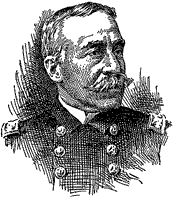
George Dewey (1837-1917)
U.S. naval commander who defeated the Spanish fleet at the Battle of Manila Bay during the Spanish-American War (1898).
A graduate of the U.S. Naval Academy at Annapolis, Md., in 1858, Dewey was commissioned a lieutenant three years later. In the U.S. Civil War (186165), he served with Union naval forces in the battles of New Orleans (1862) and Port Hudson and Donaldsonville, La. (1863). In 186465 he served in the North Atlantic blockading squadron. 
After receiving periodic promotions, Dewey was assigned (1897), at his own request, to the U.S. Asiatic squadron. Anticipating war with Spain, he undertook an intensive study of the Spanish-owned Philippine Islands and prepared his fleet for battle. When war did break out (April 1898), he sailed from Hong Kong to the Philippines, and on the evening of April 30 his squadron entered Manila Bay, where the Spanish fleet was anchored near Cavite Island. Dewey, with his four cruisers and two gunboats in line, opened fire the following morning shortly before 6:00 AM with the now-famous command, "You may fire when you are ready, Gridley." American naval gunfire had sunk or destroyed most of the Spanish warships by the time the squadron withdrew about 7:35 AM. The American ships resumed the action a few hours later to reduce the remaining Spanish ships and the shore batteries around Cavite. The Spaniards offered little effective resistance, and Dewey was able to defeat them without the loss of a single man. His victory resulted in the acquisition of the Philippines by the United States and signaled the expansion of that country's power into the western Pacific.
Dewey subsequently returned home and was welcomed in New York City with a great ovation. In March 1899 the U.S. Congress created for him the rank of admiral of the navy, the highest rank ever held by a U.S. naval officer. For the last 17 years of his life he served as president of the general board of the navy. (Encyclopaedia Britannica Article)